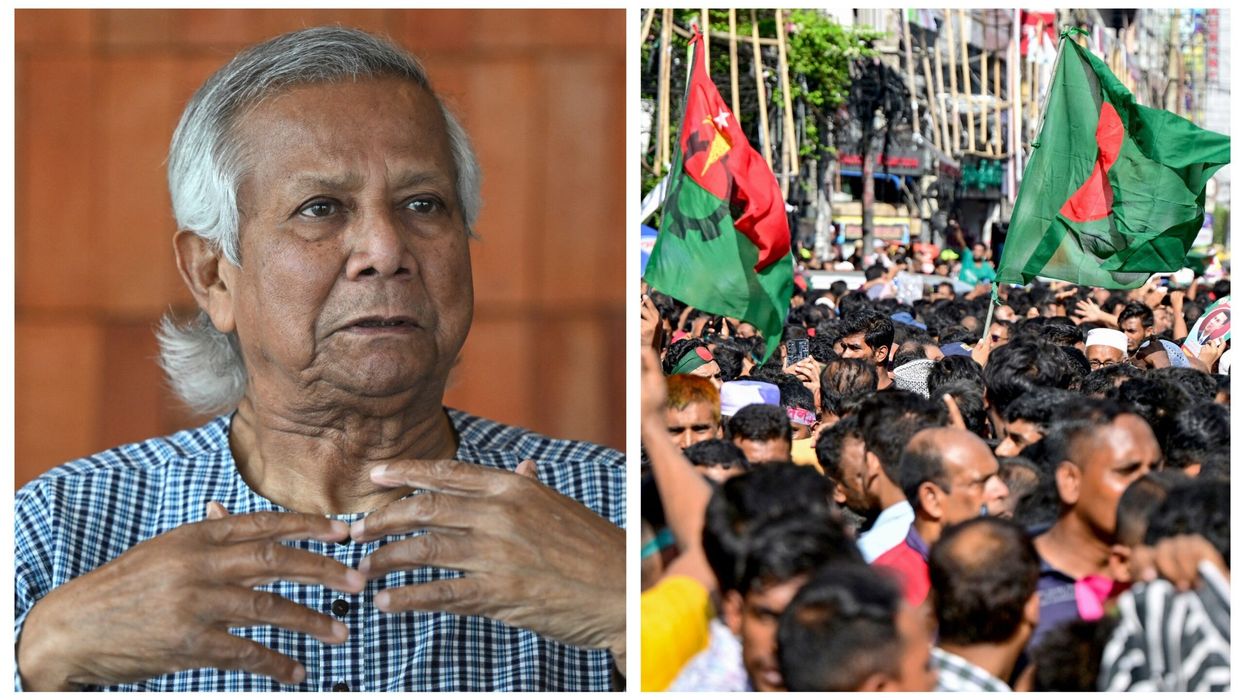BANGLADESH's Nobel-winning microfinance pioneer Muhammad Yunus will lead an interim government after mass protests forced longtime prime minister Sheikh Hasina to flee, the presidency announced Wednesday.
The decision came after student leaders called on the 84-year-old Yunus to lead, during a meeting with president Mohammed Shahabuddin, military heads, and student leaders.
"(They) decided to form an interim government with Professor Dr Muhammad Yunus as its chief," Shahabuddin's office said in a statement. "The president has asked the people to help ride out the crisis. Quick formation of an interim government is necessary to overcome the crisis." Yunus will hold the title of chief advisor, according to Haid Islam, a leader of Students Against Discrimination. Shahabuddin agreed that the interim government "will be formed within the shortest time" possible, describing the meeting as "fruitful."
Yunus, who is currently in Europe, expressed his willingness to lead the interim government. "If action is needed in Bangladesh, for my country and for the courage of my people, then I will take it," he said in a statement. He also wrote in The Economist about ensuring a free and fair election within months and called for new leaders to step forward. "Above all, we need young people who are not obsessed with settling scores, as too many of our previous governments were," Yunus wrote.
Hasina, who had been in power since 2009, resigned on Monday after mass protests, which began over government job quotas but turned into an anti-Hasina movement. Accused of rigging January elections and human rights abuses, Hasina deployed security forces against protesters, resulting in hundreds of deaths. The military turned against her, forcing her to flee to India on a helicopter. Army chief General Waker-Uz-Zaman said on Sunday it was "time to stop the violence." The military has since acceded to various demands from the student leaders, aside from Yunus's appointment.
The president dissolved parliament on Tuesday, another demand of the student leaders and the major opposition Bangladesh National Party (BNP). The head of the police force, blamed for leading Hasina's crackdown, was sacked on Tuesday. Ex-prime minister and BNP chairperson Khaleda Zia, 78, was also released from years of house arrest. The military reshuffled several generals, demoting some seen as close to Hasina, and sacking Ziaul Ahsan, a commander of the Rapid Action Battalion paramilitary force.
Since Hasina's departure, students have managed traffic in her absence. A top police official, AKM Shahidur Rahman, called on police to resume duties gradually. "The police are friends of the people and work for the public. We cannot imagine a society without the police. Therefore, I request our police members once again to ignore rumours and return to their duties in a phased manner, ensuring that security arrangements are properly in place," Rahman, now appointed as the director general of RAB, said. Reports of attacks on police stations and facilities have emerged, leading to casualties.
Businesses demanded the restoration of law and order amid arson attacks on factories. Six top officials of Bangladesh Bank resigned following unrest, with over a hundred officials storming the bank governor's office. The Daily Star reported that more than 100 officials of Bangladesh Bank forced several deputy governors to leave the office, accusing them of helping bank looters. Media reports indicate increased violence against minorities, with attacks on properties owned by Hindu communities and incidents like the vandalism of musician Rahul Ananda's residence.
Ananda's residence was vandalised on Monday, prompting him and his family to take shelter at a secret location. Saiful Islam Jarnal, one of Joler Gaan's founding members, described the attack: "The mob, after breaking the main gate, started ravaging the house, taking whatever they could find, from furniture to valuables, and then torched the whole house along with Rahul Ananda's over 3,000 musical instruments, which he designed and made over the years."
Millions of Bangladeshis flooded the streets to celebrate Hasina's departure, with crowds storming and looting her official residence. "We have been freed from a dictatorship," said Sazid Ahnaf, 21, comparing the events to the independence war that split the nation from Pakistan more than five decades ago. However, police said mobs launched revenge attacks on Hasina's allies and officers, and freed more than 500 inmates from a prison.
Monday was the deadliest day since protests began in early July, and 10 more people were killed Tuesday, taking the death toll to at least 469, according to an AFP tally based on police, government officials, and hospital doctors. Protesters broke into parliament and torched TV stations, and smashed statues of Hasina's father, Sheikh Mujibur Rahman, Bangladesh's independence hero. Neighboring India and China, both key regional allies of Bangladesh, have called for calm.
(With inputs from agencies)




